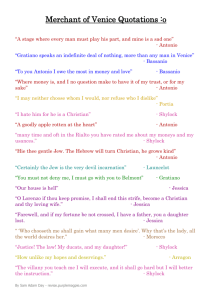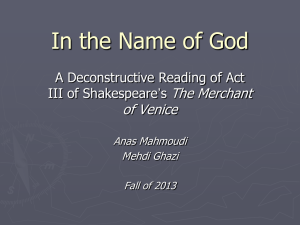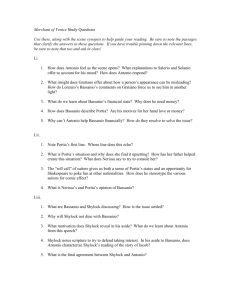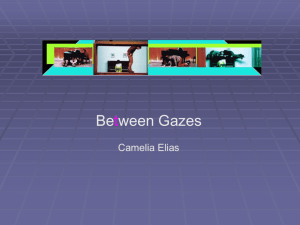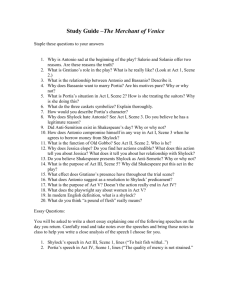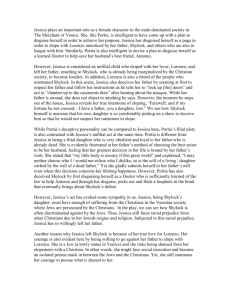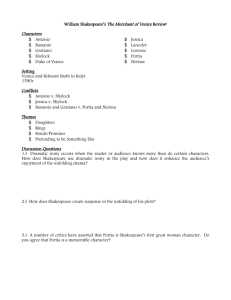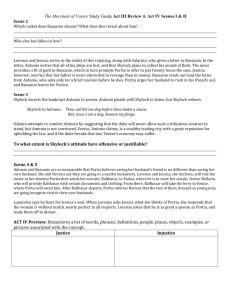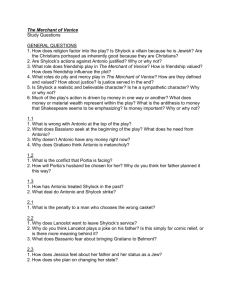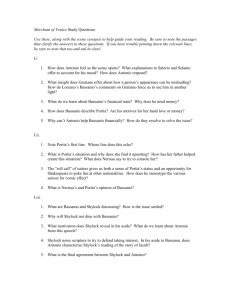Act II, Scene 1
advertisement
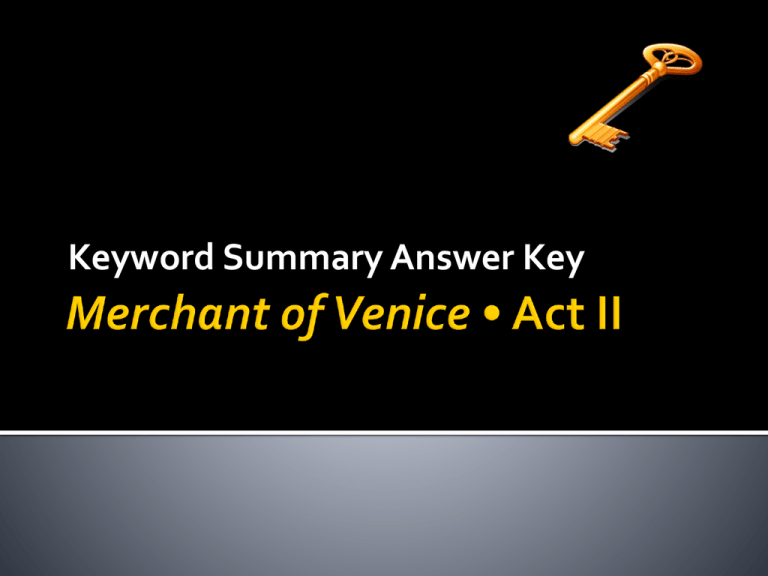
Keyword Summary Answer Key The prince of Morocco arrives to attempt to win Portia's hand in marriage. He asks Portia not to judge him by his dark complexion, assuring her that he is as brave/courageous as any European man. Portia reminds the prince that her own feelings do not matter, since her marriage will be determined by the selection from the caskets. She reminds him that the penalty for choosing incorrectly is that he must remain single forever. The prince agrees with this rule. Lancelet Gobbo, a servant of Shylock, is in the middle of a dilemma between staying to serve his master and leaving. Part of him fears that Shylock is a devil and wishes to leave, but another part reminds Lancelet of his own honest ways. Finally, Lancelet decides to leave. While he is debating himself, his father passes by, who is half blind. Lancelet decides to trick his father, and pretends to be a master who gives his father bad directions and tells him his son is dead. Finally, Lancelet reveals the truth and asks his father to help him become the servant of Bassanio. Together, father and son convince Bassanio to hire Lancelet. Next, Bassanio encounters Gratiano and tells him of his intent to travel to Belmont to win Portia. Gratiano asks to come with him, and Bassanio agrees, but only if Gratiano can control his unruly/crazy behavior. Shylock's daughter Jessica bids goodbye to Lancelet, telling him that he is a merry devil who robbed the house of some of its taste of tediousness. She gives him a letter to give to Lorenzo. In private, Jessica worries that it is a sin for her to hate her father, but admits that although she is his daughter, she is not like him in manners. She pledges to marry Lorenzo and become a Christian. Lorenzo, Gratiano, Salarino, and Solanio are attempting to plan a masque for the evening. Gratiano worries that they are not prepared, but Lorenzo assures him that it is only four o’clock and they have two hours to get ready. Lancelet enters and gives his letter to Lorenzo, who instantly recognizes the handwriting. He gives Lancelet some money and tells him to tell Jessica that he will not fail her. Lorenzo reveals that the letter explains how Jessica will disguise herself as a page (boy servant) and steal her father's gold and jewels so that they might get married. While he is continuously calling for Jessica, Shylock tells Lancelet that he will find that Bassanio will not be as lenient a master as Shylock, and will not put up with Lancelet eating and sleeping all day. Shylock prepares to leave for dinner with Lancelet, although he reveals to Jessica that he does not wish to leave after he had a foreboding dream about money. He tells Jessica to guard their house. Lancelet tells Jessica to keep her eye out the window for Lorenzo, although Jessica tells a suspicious Shylock that Lancelet merely said “farewell, mistress." Shylock snorts that Lancelet sleeps more than a wildcat, then leaves. Jessica says farewell, saying that he has lost his daughter. Salarino and Gratiano are part of the masquers partying through the streets of Venice. They stop and wait for Lorenzo, who has asked them to meet him at a certain spot. He arrives and thanks them for their patience. He then calls out to Jessica, who appears in the window of Shylock's house dressed as a page/boy, making use of the Shakespearean convention of disguises. She throws out a casket to Lorenzo filled with money/jewels. She then goes back inside and steals even more ducats/gold coins before joining them. Everyone leaves except for Gratiano, who unexpectedly meets Antonio, who tells him to get to the ship heading for Belmont, because the wind has started blowing the right way and the ship is ready to depart. The Prince of Morocco is brought into a room containing three caskets made of gold, silver, and lead. Portia tells him to make his choice. The Prince reads the inscriptions on all the caskets. The first reads: “Who chooseth me shall gain what many men desire.” The second casket reads “Who chooseth me shall get as much as he deserves.” Finally, the dull casket bears the inscription, “Who chooseth me must give and hazard all he hath”. She tells the Prince that the correct casket, or the one that will allow him to marry her, contains her picture. The Prince looks over all the inscriptions a second time, and decides that the dull one is too threatening and not worth risking anything for. He also rejects the second, which he feels is too beneath his standards. The Prince therefore chooses the first. Portia hands him the key, and he opens the casket to reveal a skull. It holds a scroll that poetically indicates that he chose superficially. The Prince departs after a hasty farewell. . Salarino and Solanio meet in the street and discuss Bassanio’s departure. They further tell the audience that Shylock returned home and discovered Jesscia’s crime. Shylock then woke up the Duke and tried to stop Bassanio’s ship, which had already set sail for Belmont. Antonio assured Shylock that Jessica was not on board the ship, but rather had been seen in a gondola. However, Shylock continues to blame Christians for the loss of his daughter and, maybe more importantly, his money and jewels. Solanio is worried about Antonio, whom he says had better repay his bond with Shylock on time, because Shylock is furious about his losses and blames him for them. Salarino indicates that a Frenchman mentioned a Venetian vessel had sunk in the English Channel (narrow seas) the day before. Both men hope that it is not Antonio's ship. The prince of Arragon arrives to take his chances with the lottery. Portia and the prince summarize the three rules every suitor must swear to before they play the lottery. The prince does not choose the gold casket because he believes that the word “many” in the riddle could refer to all men being fools. He thinks about the riddles long and hard and chooses the silver casket, hoping he gets what he deserves. The prince opens the casket only to find it contains a portrait of a blinking idiot. Following the suitor’s exit, Portia compares all men to moths and Nerissa reminds her that fate/destiny decides when men marry and die.
